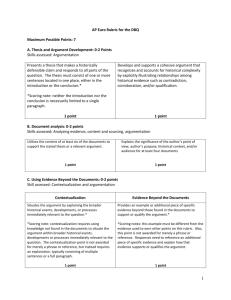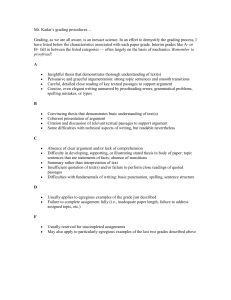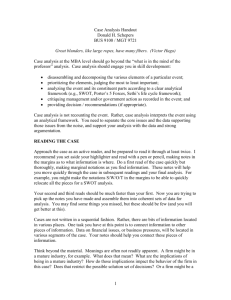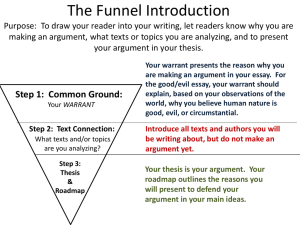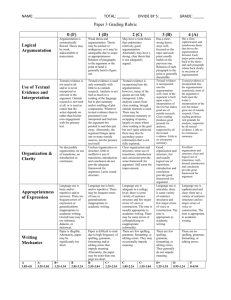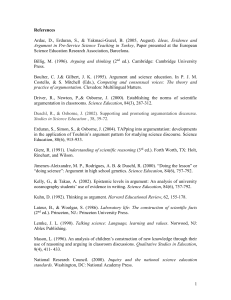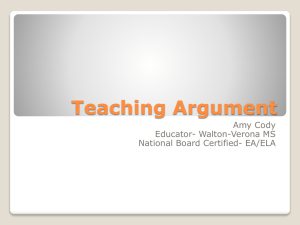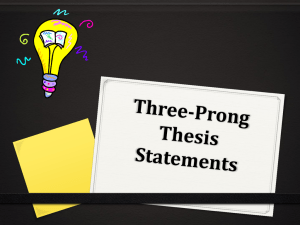Facebook Argumentation - Central Utah Writing Project
advertisement
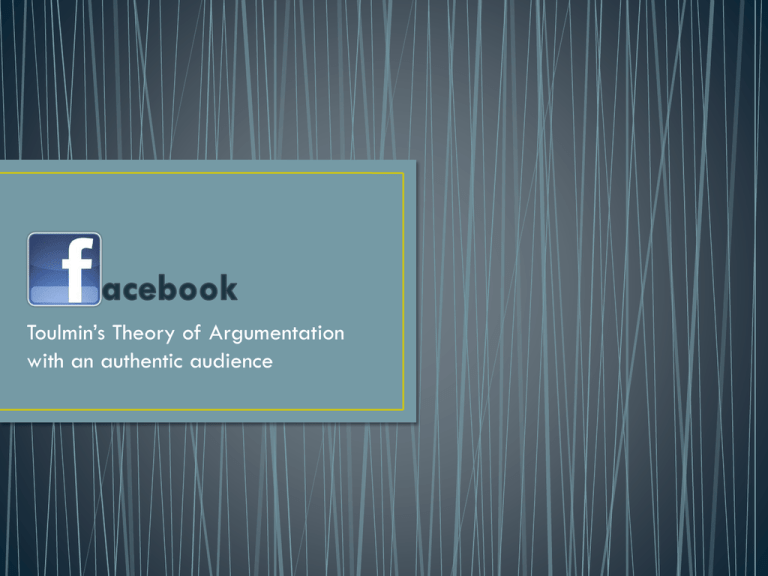
Toulmin’s Theory of Argumentation with an authentic audience • How can I get my students to care about what they are writing? Jeff Wilhelm is always talking about how students need an authentic audience and a reason to complete an assignment or project. That reason needs to transcend a “grade”. • Teachers should not be the sole recipient of students’ completed work. CUWP: Summer Institute teaches that students need opportunities to be published. • How can I encourage students to stop writing for me (the teacher) and to truly consider their audience? • Answer: By giving them real audience to consider in a forum that is almost universally familiar: FACEBOOK. • The new core greatly stresses the use of argumentation verses persuasion. As a department, we decided to work on incorporating argumentation as we slowly update our core to the new core. • (See Writing Strand grades 9-10 and 11-12 Standard 1a-e) • As a witness and orchestrator of facebook debates, I settled on argumentation as the writing style. • As a department we researched this book… “Although many teachers begin to teach some version of argument with the writing of a thesis statement (a claim), in reality, good argument begins with looking at the data that is likely to become the evidence in an argument and which gives rise to a thesis statement or a major claim. That is, the thesis statement arises from a question, which in turn rises from the examination of information or data of some sort” (Hillocks xxi). Toulmin’s basic conception of argument includes several elements: • A claim • Based on evidence of some sort • A warrant that explains how the evidence supports the claim • Backing supporting the warrants • Qualifications and rebuttals or counterarguments that refute competing claims. Argument begins with the evidence… “Students were supposed to find problems somewhere and make some claim about them. However, without analysis of any data (verbal and nonverbal texts, materials, surveys and samples), any thesis is likely to be no more than a preconception or assumption or clichéd popular belief that is unwarranted and, at worst, totally indefensible” (Hillocks xxii). Teacher models with whole group EVIDENCE RULES/WARRANTS CONCLUSION Students work in groups now to analyze the “Case of the Dead Musician” Evidence Rule/Warrant Conclusion • Library research on a current debatable criminal case. (The more advanced students usually picked something more challenging.) • Examples: • • • • • • • Kasey Anthony SOPA OJ Simpson Mark Hacking’s motives for killing his wife The disappearance of Susan Powell East High invited back into the conference Easily translated to facebook: The intro becomes the “update status”. Each subsequent paragraph is a new “comment” on the initial status, allowing for others to put their two-cents in for a more authentic argument. Argument verses persuasion The finished product Fahrenheit 451 by Ray Bradbury Newspaper article: “Atheist messages displace nativity scenes” Other similar sites that could take the place of facebook: • myfakewall.com • edmodo.com • wikispaces discussion posts Dramatizing a Heist Investigation • 5 students take on a part to play in the dramatized heist investigation as potential suspects. Those 5 students move to various locations around school. • Students in groups of 3-4 interview each suspect, taking notes on the testimony of the suspects. • In lab, groups type up an argument based on their evidence about who they think is the accomplice in the heist. • Credit is given for the assignment, but extra credit is given to the group who guess accurately and who had the most convincing argument.

